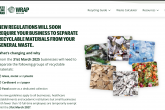Workplace recycling significantly below at-home habits
Biffa survey shows widespread recycling confusion as businesses prepare for mandatory waste separation rules, with many common recyclables still ending up in general waste.
 Four in 10 adults remain confused about recycling, with 47 per cent struggling to identify recyclable items, according to new research commissioned by Biffa.
Four in 10 adults remain confused about recycling, with 47 per cent struggling to identify recyclable items, according to new research commissioned by Biffa.
The poll of 2,000 adults found that commonly recyclable items like glass jars, tin cans, and plastic takeaway containers are still being incorrectly disposed of in general waste bins. Broken glass (36 per cent) and aerosol cans (21 per cent) are regularly misplaced in general waste, while 44 per cent incorrectly believe polystyrene is recyclable.
Roger Wright, Waste Strategy & Packaging Manager at Biffa, said: "Clear and accessible recycling information is key to helping individuals make more sustainable choices. We can see from these findings that there are clearly good intentions when it comes to recycling."
Impact on workplace recycling
The research revealed a significant disparity between home and workplace recycling habits. While 53 per cent of respondents recycle multiple times daily at home, this drops to just 17 per cent at work, despite 45 per cent noting improved workplace recycling efforts over the past five years.
The findings come as businesses prepare for mandatory recycling separation rules starting 31 March 2025. The forthcoming Simpler Recycling legislation will require businesses with 10 or more full-time employees to separate plastic, paper, card, glass, metals, and food waste from general waste.
Consumer attitudes and behaviour
The study highlighted significant gaps in recycling knowledge, with 16 per cent unaware that metal bottle tops are recyclable and 12 per cent mistakenly believing tins belong in general waste. More than one in four (26 per cent) report ‘dreading’ recycling sorting due to uncertainty about collection requirements.
Contamination remains a persistent issue, with 19 per cent admitting they only sometimes clean recyclables before disposal.
"Food residue and liquid left on recyclable items could contaminate an entire recycling load and result in it having to be disposed of rather than recycled into new products," Wright explained.
The research found strong support for improved recycling guidance, with 69 per cent calling for more available information. Additionally, 75 per cent believe product packaging should more clearly indicate recyclability.
Wright added: "Recycling rates across the UK have broadly stagnated, even declining in some regions, so it's crucial we all play our part in helping the public understand what can and can't be recycled."







